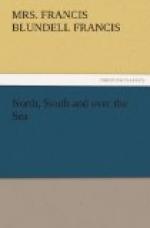Next churning day Mrs. Bold rose before dawn, according to her custom, and the churning was already in progress before the first grey, uncertain light of the autumnal morning began to diffuse itself through the latticed milk-house windows. All at once, during a pause in the labour, she fancied she heard a curious, hesitating fumbling with the latch of the door.
“Hark!” she cried, “what’s that?”
“Tis the wind,” said one of the churners.
“Nay, look, somebody’s a-tryin’ to get in,” returned the mistress, as the latch rose in a ghostly manner, fluttered, and fell. “Go to the door, Tom,” she continued, “and see what’s wanted.”
“’Tis maybe a spirit,” said Tom, shrinking back.
“Nonsense! What would a spirit want at the dairy door? ’Tis more like a tramp. Open it at once—You go, Jane.”
“I dursen’t,” said Jane, beginning to whimper.
“Not one of ye has a grain o’ sense!” said Mrs. Bold angrily.
She went to the door herself, just as the odd rattling began for the third time, opened it cautiously, and uttered a cry.
There stood the attenuated form of poor old Blackbird, looking huge and almost spectral in the dim light, but proclaiming its identity by a low whinny.
“Rabbit me!” exclaimed Tom, “if that there wold carcase ain’t found his way here again!”
But Mrs. Bold’s arms were round the creature’s neck, and she was fairly hugging him.
“Well done!” she cried ecstatically, “well done! Ye did well to come to I, Blackbird. I’ll stand by ye, never fear! I’ll not have ye drove away again.”
Blackbird stood gazing at her with his sunken eyes, his loose nether lip dropping, his poor old bent knees bowed so that they seemed scarcely able to sustain his weight; the rusty skin, which had once been of so glossy a sable, was scratched and torn in many places.
“He must have found his way out through the hedge. Well, to think of his coming here, Missis!”
“He knowed he come to the right place,” said Mrs. Bold, with flashing eyes. “Turn that there new horse out o’ the stall and put Blackbird back, and give en a feed o’ earn, and shake down a bit o’ fresh straw. ‘Tis what ye couldn’t put up wi’, could ye, Blackbird?” she continued, addressing the horse, “to find a stranger in your place! Ye come to tell I all about it, didn’t ye?”
When the farmer came down half-an-hour later, his wife emerged from the shed in the neighbourhood of the pig-styes, where she had been ministering to the wants of two motherless little pigs. One small porker, indeed, was still tucked away under her arm as she advanced to meet her husband, and she was brandishing the teapot, from which she had been feeding it, in her disengaged hand.
“Joseph,” she said, planting herself opposite to him, and speaking with alarming solemnity, “we’ve a-been wed now farty year come Lady Day. Have I bin a good wife to ’ee, or have I not?”




